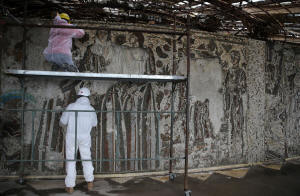Communist-era mosaics at Bulgaria's controversial monument get life
support
 Send a link to a friend
Send a link to a friend
 [October 03, 2020]
By Tsvetelia Tsolova [October 03, 2020]
By Tsvetelia Tsolova
BUZLUDZHA PEAK, Bulgaria (Reuters) -
Perched atop a mountain peak in central Bulgaria, a giant UFO-like
concrete monument, built to glorify the Balkan country's communist rule,
has been left to crumble since the totalitarian regime collapsed in
1989.
Some 30 years later, a team of restorers from five European universities
is working against time and weather to protect one of the largest
modernist mosaics in Europe, while Bulgaria decides on the fate of the
controversial monument.
Behind the plan is Bulgarian architect Dora Ivanova, whose foundation
won grants from the U.S. Getty Foundation to draw a conservation plan
for the abandoned monument and its curved intricate mosaic panels
depicting communist propaganda.

"We should not destroy everything that has been created in periods that
we like or do not like or are traumatic but on the contrary, they should
exist to remind us, to help us learn from the mistakes in the past,"
30-year-old Ivanova said.
The monument, a Brutalist example of Socialist architecture, has fallen
victim to vandalism, thieves and severe weather. Different graffiti
artists have also left their mark inside next to the original murals of
Karl Marx and Vladimir Lenin.
In 2018, the Buzludzha Monument was put on the list of seven most
endangered heritage sites in Europe by cultural heritage organisation
Europa Nostra, which wanted to have it renovated and opened to the
public.
Spread over 900 square metres (9,687 square feet) on curved walls around
a ceremonial wall, the mosaics have been damaged by rain and snow
pouring through the building's broken domed ceiling.
[to top of second column]
|

Restorers work on the mosaics inside the Buzludzha monument at
Buzludzha peak, in Stara Planina mountain, Bulgaria, September 29,
2020. REUTERS/Stoyan Nenov

For over two months restorers collected fallen pieces, injected
mortar and different materials to stabilise them.
"We are sheltering the mosaics from further decay," said Professor
Thomas Danzl, chair of the conservation department at the Technical
University of Munich, part of the restorers' team.
"Such heritage should be protected as memory of the past, even if it
is a controversial past," he said.
Bulgaria has adopted a law declaring the communist regime criminal,
but many, shaken by a painful transition to market economy, are
still nostalgic for the past.
Different governments have shied away from deciding whether
Buzludzha - built in 1981 as a memorial house to the Bulgarian
Communist Party - should be protected as a cultural heritage.
Ivanova believes it should be made safe and open for tourists and
debates, including on how Bulgarians can come to terms with their
recent history.
(Reporting by Tsvetelia Tsolova; editing by Emelia Sithole-Matarise)
[© 2020 Thomson Reuters. All rights
reserved.] Copyright 2020 Reuters. All rights reserved. This material may not be published,
broadcast, rewritten or redistributed.
Thompson Reuters is solely responsible for this content.
 |